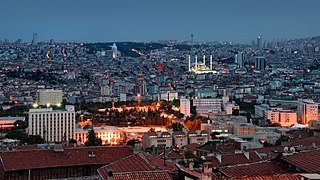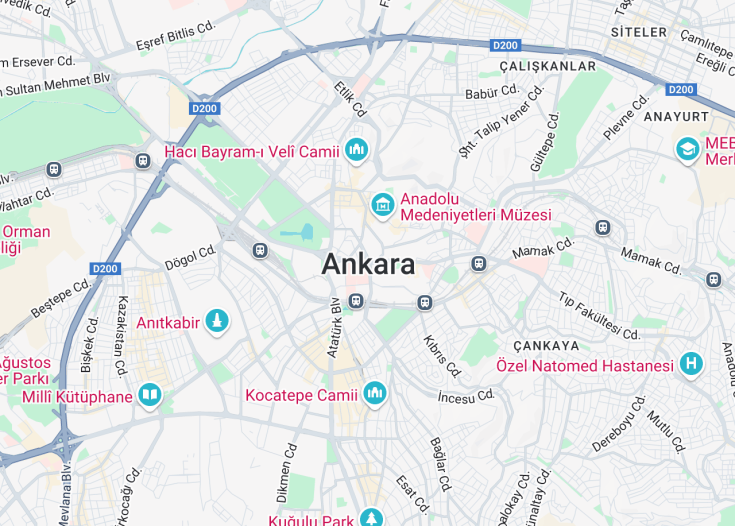Ankara, the capital city of Turkey, serves not only as a political hub but also as a rich historical canvas illustrating centuries of heritage. From its ancient Anıtkabir, the mausoleum of Mustafa Kemal Atatürk, to its modern-day sophisticated urban development, Ankara offers a diverse experience for every traveler. Museums abound, showcasing civilization from the Hittite Empire to the present day, while its parks and green areas provide serene escapes within the bustling city. Ankara seamlessly blends tradition with modernity, making it an essential destination for those who wish to comprehend the depths of Turkish culture and history.
When visiting Ankara, make sure to explore the local cuisines at the city’s traditional restaurants; their diverse flavors reflect Ankara’s cultural richness.
Plan to visit Ankara in the spring or fall when the climate is mildest and the natural surroundings are most vibrant, enhancing your sightseeing experience.
Top things to do & see in Ankara
Select the following sights and activities to discover best tickets and tours available in Ankara.
Ankara: Heart of Anatolia
| Country | Turkey |
| Time in Ankara | GMT+3 |
| Language spoken | Turkish |
| Population | 5,747,325 (Source: Turkish Statistical Institute, 2022) |
| Currency | Turkish Lira (₺, TRY) |
| Airports |
|
Located in the heart of Turkey, Ankara is not only the country’s capital city, but it also plays a critical role in politics, culture, education, and history. As the second-largest city in Turkey, Ankara is the administrative center, hosting all foreign embassies in the country. The city is characterized by its chilly, snowy winters and hot, dry summers. Ankara is a city steeped in history dating back to the Stone Age. It has been an important urban center since the Roman times, especially once Emperor Augustus declared it “the heart of his empire”.
In modern Turkish history, Ankara became significantly renowned after Mustafa Kemal Atatürk declared it as the capital of the newly formed Republic of Turkey, transforming the city into a symbol of modernization, progress, and reform. Ankara is a hub for national arts, culture, and history and hosts numerous national theaters, opera houses, orchestras, ballet companies, and the Turkish State Cemetery.
The city is home to the Anıtkabir, the mausoleum of Mustafa Kemal Atatürk, which is not only of historical significance but also a marvel of architecture. The city’s Museum of Anatolian Civilizations houses a comprehensive collection that chronicles the history of Asia Minor through artifacts from the Paleolithic era to the present. Furthermore, Ankara is a young city with its vibrant student population, thanks to having Turkey’s leading universities, including Middle East Technical University and Ankara University.
This student population helps drive the city’s economy through their consumption and innovation. Indeed, Ankara is also a big industrial and commercial hub, specialized in sectors such as government and national defense, machinery, tools, and textiles. Thanks to its central location in Turkey, Ankara serves as an important logistics hub as well, connecting roads and railways leading to different parts of the country. This connectivity not only aids its economic life but also promotes tourism, drawing visitors to its historic sites and making it a transit point for travelers heading to other parts of Turkey.
Where is Ankara?
Ankara is centrally positioned in the Anatolian part of Turkey, standing as a significant intersection that connects various parts of the country.
Distances:
| Route | Distance by car | Time by car |
|---|---|---|
| Istanbul to Ankara | 280 miles / 450 km | ~5 hours |
| Izmir to Ankara | 355 miles / 572 km | ~6 hours |
What is Ankara famous for?
Ankara is famous for its historical significance as the heart of the Republic of Turkey and as a hub for cultural and political activities. It’s noted for its landmarks such as the Anıtkabir, the grand Mausoleum of Mustafa Kemal Atatürk, and its role in the country’s modernization.
History
Prehistoric and Ancient Times
Ankara, currently the capital of Turkey, boasts a rich history that stretches back to the Stone Age. Archaeological findings reveal that the area has been inhabited since the Paleolithic era. It later flourished as Ancyra, a significant city in the classical era of the Hittites and Phrygians.
Byzantine and Ottoman Era
During the Byzantine period, the city maintained its importance due to its strategic position. Sultan Alparslan conquered Ankara in 1073, marking the beginning of the Turkish rule. By the 14th century, it had been absorbed into the Ottoman Empire, serving intermittently as a provincial capital. This period witnessed an architectural blossoming, including the construction of numerous mosques and schools.
Republican Period to Present
The pivotal transformation came in 1923 when Mustafa Kemal Atatürk declared Ankara as the new capital of the emerging Turkish Republic, shifting the center from the Ottoman capital, Istanbul. This change propelled Ankara into rapid economic and urban development, shaping it into the political hub of modern Turkey that it is today.
Visit Ankara
What to see and do in Ankara
Ankara offers a blend of historical sites and modern attractions. Key highlights include:
- The Museum of Anatolian Civilizations
- Ankara Castle
- The mausoleum of Mustafa Kemal Atatürk, Anıtkabir
- Exploring the vibrant Kızılay Square
- Enjoying the green spaces in Gençlik Park
Annual Celebrations and Festivals in Ankara
Ankara hosts several cultural events throughout the year, including the Ankara International Film Festival in March and the Ankara Music Festival in April, celebrating both local and international talent.
Best time to visit Ankara
The best time to visit Ankara is during spring (April to June) or fall (September to November) when the weather is mild and conducive to exploring the city.
Is Ankara worth visiting?
Ankara is undoubtedly worth visiting for its unique blend of historical depth and modern sophistication. Its rich cultural heritage sites, coupled with vibrant city life, make it a compelling destination for those interested in exploring the roots and evolution of Turkish civilization.










